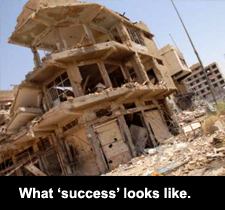The end, again.
Troops are rolling into Fallujah once again, under the cover of our air force and whatever deadly ordinance it's dropping this time around. Last time, during the "second battle of Fallujah," our arsenal included depleted uranium and white phosphorus. Fallujah was one of the first points of resistance to our 2003 invasion. U.S. forces rolled into town and set up shop in a school building. There were protests about their presence as well as their use of the facility and on April 28, 2003 and again two days later, members of the U.S. 82nd Airborne fired on the crowd, killing 17 Iraqis. (See this synopsis in TruthOut, drawing on reporting by Jeremy Scahill.) That was the start of a long and beautiful friendship.
 Today, the Baghdad government is ripping Fallujah yet another new asshole. It's worth recalling that the ISIS militants they are fighting in that unfortunate city are mostly disaffected Sunnis, the most senior of which were probably part of Saddam's army, the younger ones simply kids with no future, like so many Gazans or West Bank Palestinians. Malcolm Nance reminds us that, prior to our 2003 invasion, there were no Al Qaida to speak of in Iraq; after the invasion, they numbered in the low thousands. It wasn't until the utter failure of the post-invasion regime to incorporate Sunnis into society (and, yes, the arrest and disappearance of many at the hands of the Iraqi security forces) that these young people became fodder for opportunistic Salafi organizations like ISIS.
Today, the Baghdad government is ripping Fallujah yet another new asshole. It's worth recalling that the ISIS militants they are fighting in that unfortunate city are mostly disaffected Sunnis, the most senior of which were probably part of Saddam's army, the younger ones simply kids with no future, like so many Gazans or West Bank Palestinians. Malcolm Nance reminds us that, prior to our 2003 invasion, there were no Al Qaida to speak of in Iraq; after the invasion, they numbered in the low thousands. It wasn't until the utter failure of the post-invasion regime to incorporate Sunnis into society (and, yes, the arrest and disappearance of many at the hands of the Iraqi security forces) that these young people became fodder for opportunistic Salafi organizations like ISIS.
Trouble is, we don't remember much about even our most recent wars, let alone those fought decades ago. I heard an interview on NPR today with two New York Times reporters based in Beirut, reporting on the Syrian conflict, and they suggested that the rules of war are being broken in an unprecedented way in Syria. My first thought upon hearing this was, hadn't these people heard of, say, Fallujah in 2004? Then a few minutes later in the broadcast, the reporters said one of them had covered the second Fallujah battle. So .... were we following any rules of war worth mentioning? Do we ever? Did we in Vietnam, really? Where did the Phoenix program fit into those "rules"? How about Operation Ranch Hand?
The Syrian conflict is horrible, truly. It won't stop until the belligerents and all interested parties (including us) let go of their maximal objectives. But let's not pretend it's uniquely horrible. Not when we have the rubble of Fallujah to consider.
luv u,
jp
 Today, the Baghdad government is ripping Fallujah yet another new asshole. It's worth recalling that the ISIS militants they are fighting in that unfortunate city are mostly disaffected Sunnis, the most senior of which were probably part of Saddam's army, the younger ones simply kids with no future, like so many Gazans or West Bank Palestinians. Malcolm Nance reminds us that, prior to our 2003 invasion, there were no Al Qaida to speak of in Iraq; after the invasion, they numbered in the low thousands. It wasn't until the utter failure of the post-invasion regime to incorporate Sunnis into society (and, yes, the arrest and disappearance of many at the hands of the Iraqi security forces) that these young people became fodder for opportunistic Salafi organizations like ISIS.
Today, the Baghdad government is ripping Fallujah yet another new asshole. It's worth recalling that the ISIS militants they are fighting in that unfortunate city are mostly disaffected Sunnis, the most senior of which were probably part of Saddam's army, the younger ones simply kids with no future, like so many Gazans or West Bank Palestinians. Malcolm Nance reminds us that, prior to our 2003 invasion, there were no Al Qaida to speak of in Iraq; after the invasion, they numbered in the low thousands. It wasn't until the utter failure of the post-invasion regime to incorporate Sunnis into society (and, yes, the arrest and disappearance of many at the hands of the Iraqi security forces) that these young people became fodder for opportunistic Salafi organizations like ISIS.
Trouble is, we don't remember much about even our most recent wars, let alone those fought decades ago. I heard an interview on NPR today with two New York Times reporters based in Beirut, reporting on the Syrian conflict, and they suggested that the rules of war are being broken in an unprecedented way in Syria. My first thought upon hearing this was, hadn't these people heard of, say, Fallujah in 2004? Then a few minutes later in the broadcast, the reporters said one of them had covered the second Fallujah battle. So .... were we following any rules of war worth mentioning? Do we ever? Did we in Vietnam, really? Where did the Phoenix program fit into those "rules"? How about Operation Ranch Hand?
The Syrian conflict is horrible, truly. It won't stop until the belligerents and all interested parties (including us) let go of their maximal objectives. But let's not pretend it's uniquely horrible. Not when we have the rubble of Fallujah to consider.
luv u,
jp
Comments